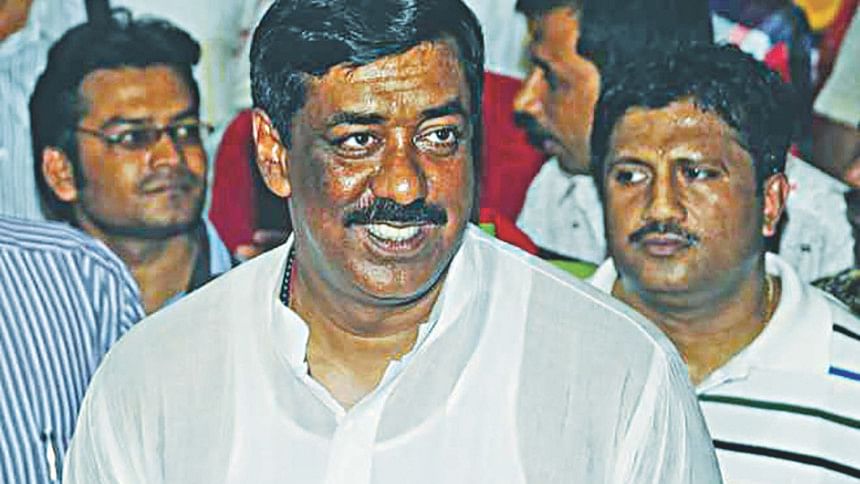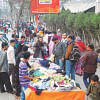Rise and fall of the Osman family

The story of the Osman family in Narayanganj is intriguing indeed. Once a well-reputed family, in later years its image has been tainted by members of the family for their rowdiness and various wrongdoings.
The latest addition to the saga of notoriety is the mayhem that we saw in Narayanganj city on Tuesday as supporters of Awami League MP Shamim Osman allegedly attacked city mayor Selina Hayat Ivy and her followers. This irked Prime Minister Sheikh Hasina and caused ample embarrassment for her party too.
This is not an isolated incident. Osman and his followers have been engaged in numerous unlawful and controversial activities over the years.
His brother, Jatiya Party MP Salim Osman, has also contributed to the further blemishing of Osman family's image. He was a much talked-about Osman family member in 2016 as he was found to be the mastermind behind all the unwholesome incidents centring on a school teacher in Narayanganj. On May 13, 2016 Shyamal Kanti Bhakta, a headmaster, was punished in the most humiliating and inhuman manner in the presence of Salim. The public shaming of the school teacher triggered nationwide outrage and further tainted the family's image.
But the incident took an uglier turn as religious bigots were brought into the scene to defend Salim Osman and to counter the overwhelming public protest against him. The religious forces—Hefazat-e-Islam and Khatme Nubuwat—took to the streets demanding capital punishment of the school teacher, accusing him of making derogatory remarks about Islam.
The allegation against the teacher was proved false in an investigation carried out by a committee of the education ministry and the teacher was reinstated in his post. But the religious fanatics continued their agitation in support of Salim Osman and with the demand of punishing the school teacher and removal of the education minister.
Salim Osman's actions against the school teacher and instigation of religious groups to take to the streets in his defence were against communal harmony and in contradiction to the core values of his grandfather Osman Ali who had worked hard to maintain communal harmony in the days of political turbulence in the 1940s.
The rise
Salim and Shamim's grandfather M Osman Ali established the Osman family in Narayanganj. Osman Ali, who migrated to Narayanganj from Comilla in the 1920s, had emerged as a distinguished personality for his good work in politics, business, culture and social welfare, according to Banglapedia.
In recognition of his philanthropic works, the British government had conferred upon him the title of "Khan Sahib". But he disowned the title in 1944 in protest of a repressive policy of the then British government. His courageous rejection of the title was widely admired.
With the beginning of the Pakistan Movement based on the Lahore Resolution of 1940, he organised the movement in Narayanganj and tried to maintain communal harmony with the cooperation of the leftist and other local leaders. He had been able to pacify the communal tension between the Hindus and Muslims in Narayanganj in 1946 on the occasion of the Hindu festival of Jhulan Jatra.
Senior Osman's activities drew people's attention and earned their respect and love. In the general election of 1946, he was elected a member of Bengal Provincial Assembly by defeating Khwaja Habibullah, the Nawab of Dhaka. He propagated progressive thoughts. He was then the president of Narayanganj City Muslim League and vice president of Dhaka District Muslim League. He had been the president of Narayanganj City Muslim League from 1942 to 1947. After the partition of India in 1947, controversies arose in Dhaka district unit of Muslim League—the Nawabs of Dhaka were on one side and the progressive group on the other. Osman supported the latter and gave a public reception to Hussein Shaheed Suhrawardy in Narayanganj.
Osman Ali was the founding member of Awami Muslim League—the first opposition party in Pakistan floated on June 23, 1949. He was held in high regard by Bangabandhu Sheikh Mujibur Rahman and other politicians of the day. He played a vital role in the Language Movement of 1952 and was imprisoned for taking part in the movement. Osman Ali actively participated in the constitutional movement of 1962, Six-Point Movement and Mass Upsurge of 1969 (Banglapedia).
Osman Ali, according to Banglapedia, was devoted to literature and culture. In the 1930s, a literary magazine styled Shabuj Bangla was published from Narayanganj. He was its editor. Rabindranath Tagore, Kazi Nazrul Islam, Abanindra Nath Tagore, Mohitlal Majumdar, Jasimuddin, Abul Mansur Ahmad, Professor Monsuruddin, Bande Ali Miah, Kazi Abdul Wadud, and Mahmuda Khatun Siddiqa used to contribute to this magazine. Osman Ali died on March 19, 1971.
Following his father's footsteps, AKM Shamsuzzoha, Osman Ali's eldest son, joined politics and was elected to the Provincial Assembly; he took a front row in politics. He was elected MP after independence in 1973. He was also one of the founders of Bangladesh Awami League and a close associate of Bangabandhu Sheikh Mujibur Rahman. He was awarded posthumously Swadhinata Padak, according to a news report run by BSS, the government official news agency, on the occasion of his 29th death anniversary on February 20, 2016.
The fall
While Shamsuzzoha was alive, his eldest son Nasim Osman joined Jatiya Party led by military dictator Gen Ershad. He became an MP in the 1986 election marred by widespread electoral irregularities. Later he was elected MP in the elections of 1988, 2008 and 2014 on Jatiya Party's ticket.
Nasim's sudden death in April 2014 opened up the window for Salim Osman to get elected as MP in a by-election. He is a businessman in Narayanganj and allegedly controls all the trade, business, imports and exports of Narayanganj. He did not need to be an MP earlier though to use political clout to control all the local business thanks to his elder and younger brothers, Nasim Osman and Shamim Osman.
But until the youngest brother Shamim Osman's election as MP in 1996 and subsequent emergence as the most-feared politician in Narayanganj, the fall of the Osman family (in terms of reputation) was not in the cards. When he was MP between 1996 and 2001, Shamim Osman was in total control of Narayanganj. The local administration was forced to side with him. The entire Narayanganj was held hostage to him and his cadres. People did not dare oppose him. Shamim Osman earned the name of the godfather of local criminals. After his party's polls debacle in 2001, Shamim fled first to India and then to Canada.
He returned in December 2006 but left again the day before the 1/11 changeover in 2007. After around eight years in self-exile, he came back to Narayanganj in April 2009 when his party AL returned to power. He had the ruling AL's backing in Narayanganj mayoral polls in 2011. The party had refused to support Selina Hayat Ivy, who defeated Shamim by a huge margin. But Ivy had to face enormous difficulties to run the city corporation in her first term due to Shamim's opposition to her.
The ruling AL picked Shamim Osman to contest for Narayanganj-4 constituency in the 2014 parliamentary election, dropping lawmaker and film actress Sarah Begum Kabori. His election as an MP in the one-sided polls helped him consolidate his base in Narayanganj.
In recent years, the Osman family drew flak on many occasions as their names came up in several incidents including the killing of schoolboy Taqi and the sensational seven-murder case of Narayanganj. But nobody in Narayanganj dares to speak in public against Shamim Osman or his family.
The image of the Osman family has been tainted by none other than its own members. The saga of the Osman family reminds us of a basic universal rule: No one can undermine you until you undermine yourself. And thus, the controversial activities of the Osman brothers have continued to bring the family ill repute. It has now become a glaring example of how the good name of ancestors can be soiled by the later generations.
Shakhawat Liton is Special Correspondent at The Daily Star.










Comments